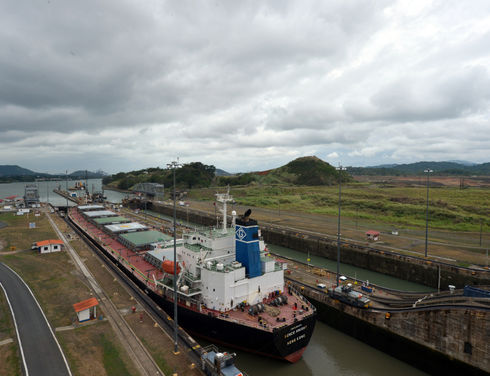Panama is implementing more security measures to prevent organized crime and the drug trade from operating within its borders, particularly given the upcoming expansion of the Panama Canal. (Rodrigo Arangua/AFP)
PANAMA CITY, Panama – With the Panama Canal expansion scheduled to open in 2014, authorities are focused on preventing the country from serving as a transit point for illegal merchandise and drug trafficking.
A total of 5% of global trade currently passes through the Panama Canal. With the construction of a third set of locks, the canal’s capacity will double, according to the Panama Canal Authority (ACP).
From January to September 2013, a total of 10,149 vessels have traversed the route through Panama, according to the country’s Comptroller Office.
“[The Panamanian government will not allow the canal to be used as a route by] international criminals transporting illegal merchandise,” Panamanian Public Safety Minister José Raúl Mulino said shortly after the July seizure of the North Korean freighter Chong Chon Gang. “Our geographic position, the canal and our lake and sea waters are not a passageway though which international criminals can move with impunity.”
The detection of the North Korean ship, which was transporting Cuban weapons to the Asian country – a violation of United Nations resolutions levied against North Korea – was described by analysts as a success because of the speed in which intelligence agencies shared information about a vessel loaded with suspicious cargo.
“The canal is a large area that supports global trade and the best way to protect it is through prevention,” said Alberto Alemán Zubieta, the former administrator of the Panama Canal. “Through intelligence work, it was possible to locate the prohibited cargo on board the Chong Chon Gang. The way to prevent terrorism and other illegal acts is through the international community and awareness about the need to prevent situations like these.”
The country is taking steps to prevent its territory, including the canal, from being used to smuggle illegal substances. Operation Martillo plays a fundamental role in these efforts, according to the director of the country’s National Aeronaval Service (SENAN), Commander Belsio González Sánchez.
“Through Operation Martillo [a multinational military initiative led by the United States that is combating drug trafficking and organized crime in Central America], we’re creating a symbiosis of operations with many different countries, particularly the United States, which has helped to stop incursions by drug traffickers,” González said.
From January to Nov. 15, authorities confiscated about 19 tons of drugs, up from the 12 tons seized during all of 2012.
The country is implementing a new base in the southern Pearl Islands in the Gulf of Panama to strengthen surveillance in the area, which will enter into operation in January 2014.
Panama also has acquired speedboats, helicopters and 19 radars, to conduct coastal surveillance and combat drug trafficking in the Caribbean and the Panamanian Pacific, which are slated to become operational by April 2014.
“Any investment made to enhance security is always a good thing,” said Roberto Aparicio, a professor of maritime law at Panama’s Maritime University.
Regarding the canal’s operations, González said work is carried out in conjunction with the ACP to protect cargo and ensure that all permits are in order.
“We work with [the ACP] on issues related to high value trafficking, because there are ships passing through with hazardous materials over which they are given custody,” González said. “[To combat drug trafficking] we have a joint operation. [The ACP makes sure that] the permits for the vessels are in order, but it does not get involved in intelligence matters.”
Former Panamanian Ambassador Ricardo Arias, who directed the United Nations Security Council in 2007, has applauded the steps authorities are taking to protect the country from drug traffickers and organized crime.
“Though the shipment of drugs doesn’t affect the functioning of the canal or put it at risk, Panama must introduce mechanisms to prevent the entire country from being used to smuggle illegal substances and drugs,”
